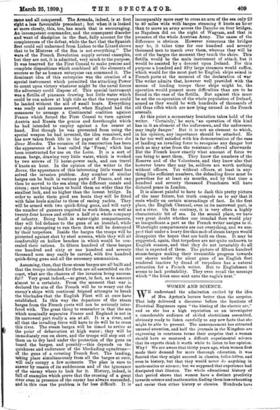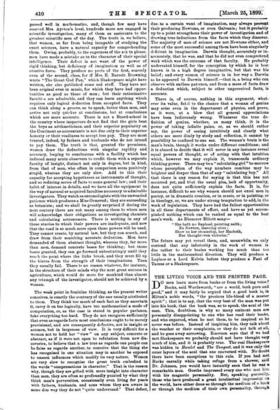WOMEN AND SCIENCE.
WE understand the admiration excited by the idea of Mrs. Ayrton's lecture better than the surprise. That lady delivered a discourse before the Institute of Electrical Engineers upon "the hissing of the electric arc," and as she has a high reputation as an investigator a considerable audience of skilled electricians assembled, obviously ready to listen carefully to any new facts that she might be able to present. The announcement has attracted unusual attention, and half the journals in the Kingdom are expressing in courteous terms their surprise that a woman should have so mastered a difficult experimental science that its experts think it worth while to listen to her opinion. Why ? We are aware that thirty years ago, when women first made their demand for more thorough education, it was fancied that they might succeed in classics, belles-lettres, and even in history, but that they would never do anything in mathematics or science; but we supposed that experience had dissipated that illusion. The whole educational history of that period shows that women have a distinct proclivity towards science and mathematics, finding them less exhausting and easier than either history or classics. Hundreds have passed well in mathematics, and, though few may have reached Mrs. Ayrton'a level, hundreds more are engaged in scientific investigation, many of them as assistants to the greatest scientific men of the day. The truth is, we believe, that women, so far from being incapable of studying the exact sciences, have a natural capacity for comprehending them. Owing, probably, to the eagerness of the sex to please. men have made a mistake as to the character of their special intelligence. Their defect is not want of the power of rigid thinking, but deficiency of imagination as well as of creative force. They produce no poets of the first, scarcely even of the second, class, for if Mrs. E. Barrett Browning wrote "The Great God Pan," which Shakespeare might have written, she also published some sad stuff. They have not been original even in music, for which they have had oppor- tunities as good as those of men ; but their ratiocinative faculti-s are admirable, and they can learn anything which requires only logical deduction from accepted facts. They can think along a groove, so to speak, better than men, and arrive not only quicker at conclusions, but at conclusions which are more accurate. There is not a Board-school in the country where inspectors do not find that the girls beat the boys as arithmeticians, and their superior popularity on the Continent as accountants is not due only to their superior honesty or their readiness to accept less pay. They are most trusted, indeed, by fathers and husbands who do not intend to pay them. The truth is that, granted the premisses, women draw the deductions with singular rapidity and accuracy, leaping to conclusions with a facility which has induced many acute observers to credit them with a separate faculty of insight, distinct not only in degree, but in kind, from that of men, who often in comparison seem positively stupid, whereas they are only slow. Add to this their capacity for accepting hypotheses as instruments of thought, and so reducing series of facts to some general law ; and their habit of interest in details, and we have all the equipment in the way of natural or acquired faculties necessary to admirable investigators. They watch as entomologists with the unwearied patience which produces a Miss Ormerod; they are succeeding as botanists ; and we shall be greatly surprised if during the next century there are not many among them to whom men will acknowledge their obligations as investigating chemists and calculating astronomers. There is nothing in any of those studies to which their powers are inadequate, and now that the road is so much more open those powers will be used. They cannot create, by natural law, but they can search, and draw from their searching accurate deduction. Men have demanded of them abstract thought, whereas they, far more than men, demand concrete bases for thinking; but those bases granted, they can go forward unhesitatingly until they reach the point where the links break, and they must fill up the hiatus from the strength of their imaginations. Then they usually fail. There is no reason whatever, for instance, in the structure of their minds why the next great success in agriculture, which would do more for mankind than almost any triumph of the investigator, should not be achieved by a woman.
The weak point in feminine thinking, as the present writer conceives, is exactly the contrary of the one usually attributed to them. They think too much of each fact as they ascertain it, carry it on too logically, have too mathematical a mode of computation, or, as the case is stated in popular parlance, take everything too hard. They do not recognise sufficiently that even as regards facts most conclusions ought to be merely provisional, and are consequently defective, not in insight or acumen, but in largeness of view. It is very difficult for a woman not to hold her " view " on any subject, concrete or abstract, as if it were not open to refutation from new dia. coveries, to believe that a law true as regards one people can be false as regards another, to conceive that the thing she has recognised in one situation may in another be exposed to unseen influences which modify its very nature. Women are very slow to recognise the great truth embodied in the words "compensations in character." That is the reason why, though they are gifted with more insight into character than men, they are often so profoundly puzzled by what they think men's perversities, occasionally even living for years with fathers, husbands, and sons whom they are aware in some dim way they do not "quite understand." That defect,
due, to a certain want of imagination, may always prevent their producing Newtons, or even Galvanis ; but it probably up to a point strengthens their power of investigation and of drawing true inductions from the facts which they discover. The majority of men of science are not Newtons either, and some of the most successful among them have been singularly deficient in imagination. Darwin thought, accurately or in- accurately, that he was, and that he did not even comprehend work which was the outcome of that faculty. He probably
underrated himself, for the conception by which he is best known is in a high degree imaginative, but that was his belief ; and every women of science is in her way a Darwin as he appeared to Darwin himself,—that is, a being who can observe with endless patience, and from a mass of facts draw a deduction which, subject to other unperceived facts, is accurate.
There is, of course, nothing in this argument, what- ever its value, fatal to the chance that a woman of genius may arise even in the department of physics, and prove, as it were, at a blow that all general appreciations have been ludicrously wrong. Whatever the true de- finition of genius, whether, as many think, it is the power of taking infinite pains, or, as we should rather say, the power of seeing intuitively and clearly what others see more dimly by study and reflection, it cannot by possibility be confined to one sex. The woman's brain is the man's brain, though it works under different conditions; and it is absurd to decide that it will never in any instance reveal equal powers of thought, or of acting with that intuition which, however we may explain it, transcends ordinary thinking power. There may be a " calculating girl "to-morrow whose perception of the way numbers combine may be brighter and deeper than that of any "calculating boy." All that there is any reason for saying is that this has not occurred yet, and that the usual plea, lack of opportunity, does not quite sufficiently explain the facts. It is, for instance, difficult to see why women should not excel men in
poetry, or in dramatic creation, or, in music, or in painting, or
in theology, or, we are under strong temptation to add, in the work of legislation. They have had the fullest opportunities in all those departments of effort, and have as yet accom- plished nothing which can be ranked as equal to the best men's work. As Ebenezer Elliott sang-
" She hath no Raphael, painting saith; No Newton, learning cries ;
Show us her steamship, her Macbeth, Her thought-won victories."
The future may yet reveal them, and, meanwhile, we only
contend that any inferiority in the work of women is due rather to their brains working too much than too little in the mathematical direction. They will produce a
Laplace or a Lord Kelvin before they produce a Paul of Tarsus or a Shakespeare.







































 Previous page
Previous page